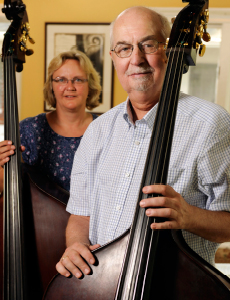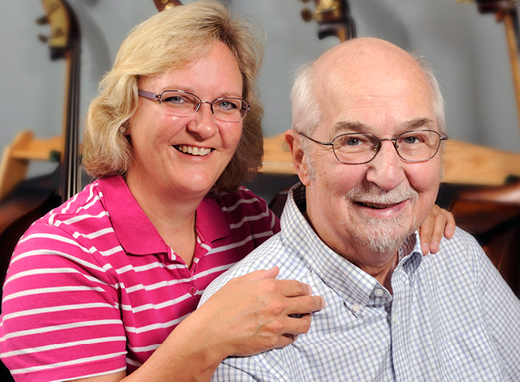Modulation
One year in the cancer journey of a symphony family
Halloween has always been big at the Joneses. They drape cobwebs on their porch, strategically place a mat that plays scary music when visitors come to the front door, and litter their lawn with creepy tombstones.
The parents, Ralph and Gloria Jones, even don costumes every year when they perform with the Atlanta Symphony Orchestra for the annual Halloween concert.
This year their decorations include a life-size mask that eerily resembles Ralph’s face and neck. That’s because the 3-D mask was created for Jones at Emory to help radiologists mark the exact location of an aggressive, stage IV cancer that had taken hold at the base of the tongue.
Jones received his cancer diagnosis on May 7, 2010, a day that he and his family will never forget and which they say has changed their lives forever. He had had few warning signs—a little blood in his saliva, a small lump that suddenly appeared on his neck, and in hindsight, a persistent cough. Since that time, the Atlanta Symphony’s principal bassist has undergone surgery, chemotherapy, and two rounds of radiation at Emory’s Winship Cancer Institute.
Under the care of a team of specialists that rivals the number of players in the symphony’s bass section, Jones has had to relearn how to swallow. For a while, he lost the characteristic beard for which his bass students had dubbed him “Sir Ralph.” His voice has even changed in timber and pitch. But he can still make music that moans, weeps, skips, and soars.
After many months of treatment, Jones returned to the orchestra part-time for rehearsals, and Gloria Jones recorded events in a journal that she has kept from the beginning of their cancer journey. “Today he made it through the entire rehearsal time of the Dvorak 7th Symphony,” she wrote in March. “This piece is tiring for a healthy person, much less a compromised one, so I am also bursting with pride for him.”
Emory radiation oncologist Jonathan Beitler had seen Ralph Jones once a week or more during 35 rounds of radiation treatment. He now got to see his patient in another setting—Atlanta’s Symphony Hall, complete with a backstage tour to meet the musicians. (Beitler has since become a season symphony subscriber.)
Too soon, however, neither Beitler nor the Joneses would have any reason to celebrate. Despite victory in the tongue and neck, a small blueberry-sized spot had turned up on Ralph’s sternum, and it was malignant.
Déjà vu

|
The team at Winship discussed whether to remove the spot or leave it alone. Based on the experience of a previous patient, they ultimately decided on surgery—and additional sessions of radiation.
“There are no solid answers here, and that is very scary,” wrote Gloria Jones.
After a performance with the Atlanta Symphony in Savannah—where Ralph got a hug from guest conductor Roberto Abbado during the applause—the Joneses were back at Winship in a place that was all too familiar. “Walking back down into the radiation oncology tunnel gave both of us a weird feeling of déjà vu,” Gloria wrote. “Ralph said just now, ‘I would rather not be here.’ That says it all.”
To prepare for the second round of radiation, Beitler took a CT scan of the area around Jones’s sternum, measuring the thickness of the bone and adjusting the radiation beam to make sure the heart would be protected during treatment. Jones got a black circle the size of an orange drawn on his chest, precisely mapping the location for radiation delivery. It was easier the second time around, he says, with each treatment taking only two minutes.
“We carefully check measurements to compare what we are planning to do against what we are delivering,” Beitler says.
Radiation has always been a rapidly expanding field, and now more than ever, technology is allowing radiologists to target smaller and smaller tumors while minimizing damage to surrounding tissue. “As chemotherapy gets better, radiation is going to be even more important,” Beitler says. “Chemo is systemic, and radiation is local. One barrier to cancer survival now is local control.”
Currently the most precise local control uses proton therapy, and Emory is making plans to open the first proton therapy center in Georgia. Only nine other centers in the United States currently offer proton therapy, and the closest to Georgia is at the University of Florida in Jacksonville.
Proton therapy allows for the greatest possible control of the radiation energy deposited in the body because of a Bragg Peak, which determines the rate at which a particle delivers energy as it travels through space. Protons exhibit a sharper Bragg Peak than conventional radiation therapy, meaning they deposit more energy over a short amount of time. This characteristic enables the radiation oncologist to target cancer cells with radiation so that energy is deposited to the tumor, not the healthy surrounding tissue.
Proton therapy will complement rather than replace traditional radiation therapy. Its precision makes it ideal for treating areas of high sensitivity such as the prostate, brain, and eye.
The very tunnel where the Joneses found themselves in April currently is undergoing renovation to bring in new radiation equipment, adding to Winship’s arsenal. Site selection also is under way for the proton facility, which will require a massive cyclotron being built in Europe.
Gloria Jones noted the changes in her journal, after watching an online interview with Beitler. “His hope is that when he retires, everything he learned as a student is obsolete,” she wrote. “The way they are improving treatment, I wouldn’t be surprised if his dream comes true.”
Easter promises
For now, the Joneses are focused on their own dreams—a healthy, cancer-free father, attendance at symphony rehearsals, trips to the beach, and going to school programs for their children, Christopher—a teenager—and Shelley in elementary school.
Although Ralph continues to have trouble with swallowing and is fighting fatigue, he has returned fulltime to the symphony. He would like to eat a juicy cheeseburger one day. For now, it is enough to be cancer-free.
In the midst of returning to something more closely resembling normal, Ralph and Gloria took time to talk up free screenings for throat and oral cancers at Winship this summer. After Gloria came out with a clean check-up, the couple went around the Emory Clinic drumming up business for the screenings. Of the 111 people screened that day, some had issues that needed further study, Gloria says, even fellow symphony member and violinist Frank Walton. His screening revealed a cancerous growth on his vocal chords.
“His wife says we saved his life,” says Gloria. “If we saved just one person from what we’ve been through, it was worth our time.” —Rhonda Mullen
|
Web Connection: To see a video about the Joneses and hear them play a double bass duet, visit bit.ly/jonesbasscancer. To learn about radiology imaging services, contact 1-888-WINSHIP or visit cancer.emory.edu. In May 2012, Emory will offer free throat and mouth cancer screenings at Relay for Life in Gwinnett County and at the Atlanta Motor Speedway on Labor Day. |



